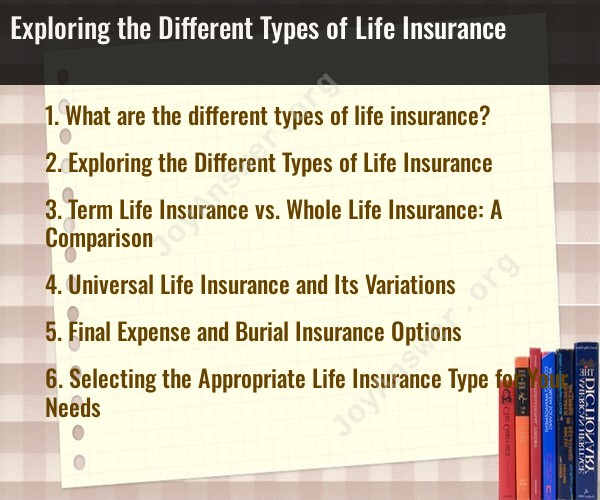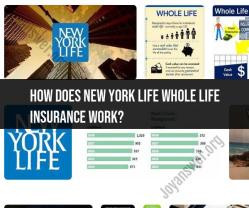What are the different types of life insurance?
Life insurance is a financial product that provides a death benefit to the beneficiary or beneficiaries named in the policy upon the death of the insured. There are several types of life insurance, each with its own features and benefits. Here are the most common types:
Term Life Insurance:
- Term life insurance provides coverage for a specific term, such as 10, 20, or 30 years.
- It is relatively affordable and straightforward.
- If the insured person dies during the term, the policy pays out a death benefit to the beneficiaries.
- It does not have a cash value component, making it a pure protection product.
Whole Life Insurance:
- Whole life insurance is a type of permanent life insurance that provides coverage for the entire lifetime of the insured.
- It includes a cash value component that grows over time and can be accessed or borrowed against.
- Premiums are generally higher than term insurance but remain level for the life of the policy.
- It provides both a death benefit and a savings or investment component.
Universal Life Insurance:
- Universal life insurance is another form of permanent life insurance.
- It offers more flexibility in terms of premium payments and death benefit adjustments.
- Policyholders can also invest the cash value component in various investment options.
- It may be subject to market risks but can offer the potential for higher returns.
Variable Life Insurance:
- Variable life insurance is a type of permanent life insurance that allows policyholders to invest the cash value in a range of investment options like stocks and bonds.
- The death benefit and cash value can vary based on the performance of these investments.
- It offers the potential for greater returns but comes with higher risk.
Variable Universal Life Insurance:
- This is a combination of universal and variable life insurance.
- Policyholders have the flexibility to adjust premiums, death benefits, and investments.
- The cash value can grow or decline based on the performance of investments chosen.
Indexed Universal Life Insurance:
- Indexed universal life insurance offers a cash value component tied to the performance of a stock market index, like the S&P 500.
- It provides potential for cash value growth while protecting against market downturns.
Final Expense (Burial) Insurance:
- Final expense insurance is a smaller whole life policy designed to cover the costs of funeral and burial expenses.
- It typically has lower death benefits and is easier to qualify for.
Guaranteed Issue Life Insurance:
- Guaranteed issue life insurance is a type of whole life insurance that doesn't require a medical exam or health questions.
- It's typically more expensive and offers lower death benefits, making it an option for individuals who may not qualify for other types of insurance.
Joint Life Insurance:
- Joint life insurance covers two individuals, typically spouses, under a single policy.
- The death benefit is paid out upon the first person's death, and the policy terminates.
Choosing the right type of life insurance depends on your individual needs, financial goals, and budget. It's essential to carefully evaluate your circumstances and consider factors like the desired coverage, premium costs, and investment objectives before selecting a life insurance policy.
Exploring the Different Types of Life Insurance
There are three main types of life insurance: term, whole, and universal. Each type has its own unique features and benefits, so it is important to understand the differences before choosing a policy.
Term life insurance is the simplest and most affordable type of life insurance. It provides coverage for a specific period of time, such as 10, 20, or 30 years. If the policyholder dies during the term of the policy, the beneficiaries receive a death benefit. Term life insurance is a good option for people who need temporary coverage, such as to protect their family while they have young children or to pay off a mortgage.
Whole life insurance provides coverage for the policyholder's entire lifetime. In addition to a death benefit, whole life insurance policies also accumulate a cash value. The cash value can be borrowed against or withdrawn tax-free. Whole life insurance is a good option for people who want lifelong coverage and/or the ability to build a tax-free savings account.
Universal life insurance is a hybrid type of life insurance that combines the features of term and whole life insurance. Universal life insurance policies provide coverage for the policyholder's entire lifetime, but the policyholder has more control over the premium payments and the cash value than with a whole life insurance policy. Universal life insurance can be a good option for people who want the flexibility to adjust their coverage and savings needs over time.
Term Life Insurance vs. Whole Life Insurance: A Comparison
Here is a comparison of term life insurance and whole life insurance:
| Feature | Term Life Insurance | Whole Life Insurance |
|---|---|---|
| Policy length | Specific period of time | Entire lifetime |
| Death benefit | Yes | Yes |
| Cash value | No | Yes |
| Premiums | Lower | Higher |
| Flexibility | Less flexible | More flexible |
Universal Life Insurance and Its Variations
There are two main types of universal life insurance: guaranteed universal life insurance and variable universal life insurance.
Guaranteed universal life insurance policies offer a guaranteed death benefit and a guaranteed minimum interest rate on the cash value.
Variable universal life insurance policies offer a death benefit that is based on the performance of underlying investments. The cash value in a variable universal life insurance policy can also be invested in a variety of investment options.
Final Expense and Burial Insurance Options
Final expense insurance and burial insurance are types of life insurance that are designed to cover the costs of a funeral and other end-of-life expenses. Final expense and burial insurance policies are typically smaller in value than other types of life insurance policies, but they are also more affordable.
Selecting the Appropriate Life Insurance Type for Your Needs
The best type of life insurance for you will depend on your individual needs and budget. If you are looking for temporary coverage at an affordable price, term life insurance is a good option. If you want lifelong coverage and/or the ability to build a tax-free savings account, whole life insurance is a good option. If you want the flexibility to adjust your coverage and savings needs over time, universal life insurance is a good option. If you are looking for a policy to cover the costs of a funeral and other end-of-life expenses, final expense or burial insurance is a good option.
It is important to compare different life insurance policies and rates before choosing a policy. You should also talk to a financial advisor to get help choosing the right type and amount of life insurance for your needs.













